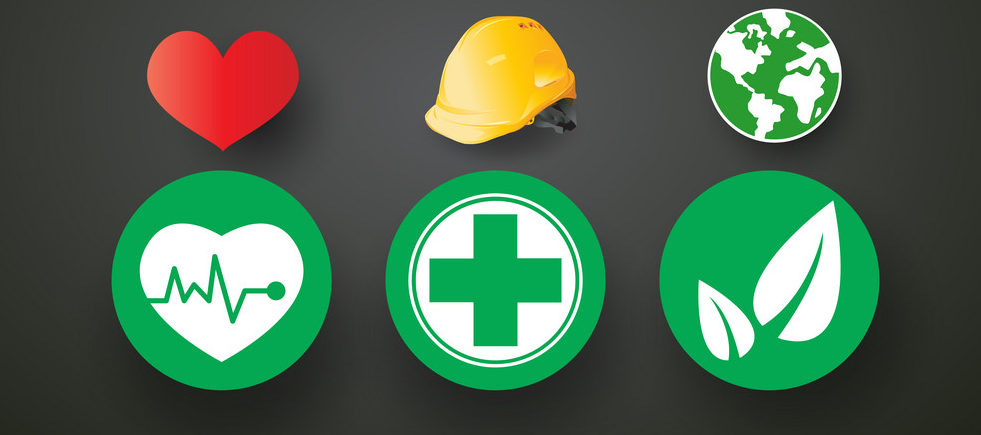BSc in Health, Safety and Environment
Undergraduate Program

About BSc in Health, Safety and Environment
The Bachelor of Science (BSc) in Health, Safety, and Environment Engineering is a comprehensive program designed to prepare students for careers in ensuring the safety, health, and environmental sustainability of operations in the oil and gas sector. This program integrates engineering principles with specialized knowledge in safety management, risk assessment, and environmental protection.
بكالوريوس العلوم في هندسة الصحة والسلامة والبيئة هو برنامج شامل مُصمم لإعداد الطلاب لوظائف تضمن استدامة السلامة والصحة والبيئة في قطاع النفط والغاز. يدمج هذا البرنامج مبادئ الهندسة مع المعرفة المتخصصة في إدارة السلامة وتقييم المخاطر وحماية البيئة.
Program Learning outcome:
- Safety Engineering: Apply engineering principles to design and improve safety systems and protocols
- Health Management: Assess health risks and develop strategies to protect worker well-being
- Environmental Sustainability: Understand impacts and implement conservation and sustainable practices
- Regulatory Compliance: Interpret and apply relevant HSE laws and standards; ensure operational compliance
- Risk Management: Conduct risk assessments and implement mitigation plans across operations
- Emergency Preparedness: Develop and evaluate emergency response plans and drills
- Technical Communication: Effectively report and present HSE data to diverse stakeholders
- Ethical Conduct: Uphold professional ethics and promote safety culture
- Teamwork & Leadership: Collaborate across disciplines and lead safety initiatives
- Continuous Improvement: Pursue ongoing learning and enhance HSE performance through innovation
مخرجات التعلم
- هندسة السلامة: تطبيق مبادئ الهندسة لتصميم وتحسين أنظمة وبروتوكولات السلامة.
- إدارة الصحة: تقييم المخاطر الصحية ووضع استراتيجيات لحماية صحة العمال.
- الاستدامة البيئية: فهم الآثار وتطبيق ممارسات الحفاظ على البيئة والاستدامة.
- الامتثال التنظيمي: تفسير وتطبيق قوانين ومعايير الصحة والسلامة والبيئة ذات الصلة؛ وضمان الامتثال التشغيلي.
- إدارة المخاطر: إجراء تقييمات للمخاطر وتنفيذ خطط التخفيف في جميع العمليات.
- التأهب للطوارئ: وضع وتقييم خطط وتدريبات الاستجابة للطوارئ.
- التواصل الفني: الإبلاغ الفعال عن بيانات الصحة والسلامة والبيئة وعرضها على مختلف الجهات المعنية.
- السلوك الأخلاقي: التمسك بأخلاقيات المهنة وتعزيز ثقافة السلامة.
- العمل الجماعي والقيادة: التعاون بين مختلف التخصصات وقيادة مبادرات السلامة.
- التحسين المستمر: مواصلة التعلم المستمر وتحسين أداء الصحة والسلامة والبيئة من خلال الابتكار.
Requirements:
Local or international secondary school certificate.
الشهادة الثانوية المحلية اوالدولية
Career Opportunities:
1. HSE Engineer/Coordinator.
2. Environmental Health and Safety (EHS) Specialist.
3. Industrial Hygienist.
4. Occupational Health and Safety Officer:
5. Safety Consultant
6. Risk Manager.
7. Emergency Response Coordinator.
8. Environmental Consultant.
9. Regulatory Compliance Officer.
10. Quality Assurance/Quality Control (QA/QC) Specialist.
11. Training and Development Specialist.
12. Construction Safety Officer.
13. Oil and Gas Safety Engineer.
14. Health and Safety Manager.
فرص العمل
- مهندس/منسق الصحة والسلامة والبيئة (HSE)
- أخصائي الصحة والسلامة والبيئة (EHS)
- أخصائي الصحة الصناعية
- مسؤول الصحة والسلامة المهنية
- مستشار السلامة
- مدير المخاطر
- منسق الاستجابة للطوارئ
- مستشار بيئي
- مسؤول الامتثال التنظيمي
- أخصائي ضمان الجودة/مراقبة الجودة (QA/QC)
- أخصائي التدريب والتطوير
- مسؤول السلامة في مواقع البناء
- مهندس سلامة في قطاع النفط والغاز
- مدير الصحة والسلامة
The tuition fees amount is 10,000 Libyan Dinars for the academic year of 2025/2026.
تبلغ قيمة الرسوم الدراسية للعام الدراسي 2025/2026 مبلغ 10,000 دينار ليبي.
Application Form نموذج التسجيل

Contact Us
What will you study?
| Title | code | credit hours |
|---|---|---|
| 1 - Introduction to Health, Safety, and Environment | HSE101 | 3 |
| 2 - Basics of Petroleum Engineering | PE101 | 3 |
| 3. Introduction to Information Technology | IT101 | 2 |
| 4. English Language I | EL101 | 6 |
| 5 - Mathematics | MA101 | 3 |
| 6- Research Methods | RM101 | 2 |
| Title | code | credit hours |
|---|
| Title | code | credit hours |
|---|